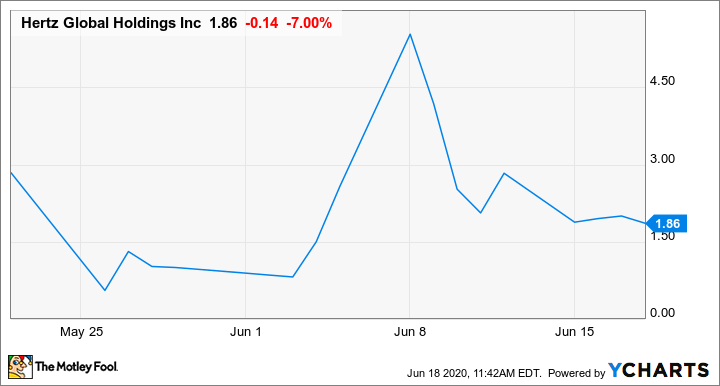Hertz (HTZ +0.00%) stock has been a roller coaster ride since the company filed for Chapter 11 bankruptcy protection on May 22. Of late, this rental car company has been one of the more confusing and mystifying stocks in recent memory, including a highly speculative recent run-up in price, the company asking for approval to issue new shares while in bankruptcy, and a notice to be delisted from the New York Stock Exchange (NYSE).
Let's zero in on one of the least understood developments, a potential Hertz delisting, and what it means for investors.
Hit the road, Hertz
On May 26, NYSE staff sent a notice to Hertz management saying that the company would no longer be suitable for listing on the exchange per NYSE Listed Company Manual Section 802.01D, which essentially says a company can be delisted if it files for bankruptcy protection, among other stipulations. Investors are still able to trade Hertz shares on the exchange because the company promptly filed an appeal and requested a meeting with the staff. Once that meeting takes place and the NYSE comes to a final conclusion, we will likely see Hertz officially delisted.
So what happens to investors?

Image source: Getty Images.
A company being delisted sounds scary for investors, but nothing directly happens to the stock you own in terms of the share count or ownership percentage. What does change is the ability for some investors to trade the shares as they're moved to "over-the-counter" (OTC) trading, which is simply trading that takes place off the exchanges. OTC equities are generally smaller companies that can't meet requirements the exchanges set for listing, or they are delisted companies that have filed for bankruptcy (like Hertz). Equities on the OTC are largely owned by retail investors, because many institutional investors and hedge funds shy away from these stocks. This smaller pool of investors makes the stock less liquid, but that's not the only drawback of being delisted.
"Delisting our common stock may adversely impact its liquidity, impair our stockholders' ability to buy and sell our common stock, impair our ability to raise capital, and the market price of our common stock could decrease," Hertz explained in a June 15, Form 8-K SEC filing that explained the situation to investors. "Delisting our common stock could also adversely impact the perception of our financial condition and have additional negative ramifications, including further loss of confidence by our employees, the loss of institutional investor interest and fewer business opportunities."
What's next?
In some instances, companies that hit financial troubles will voluntarily pull their listing from the NYSE to save on fee expenses, but being delisted is widely viewed as a negative development. As you can see in the graph above, Hertz's stock price volatility has decreased since its nonsensical run from $0.40 per share low on May 26 to its speculative $6.25 per share intraday high on June 8. The lower volatility and slowdown in trading volume could signal that investors are done playing the dangerous game of trading this stock as it slowly becomes worthless, especially when Hertz is in danger of being officially delisted at any moment.
While some investors (including billionaire hedge fund manager and former 39% stakeholder of Hertz, Carl Icahn) remain optimistic about Hertz's ability to continue operating, potential investors in this transportation industry stock would be wise to wait for a restructured company to emerge and for the new company to issue a new stock offering.
However, that's only one potential outcome of Hertz's bankruptcy process. Creditors could opt to simply liquidate the company to get as much value as possible. For now, the company will continue to operate with what cash it has left as the negotiations between Hertz and its creditors continue, and although investors can still technically buy and sell Hertz stock if it's delisted, it might be a smart time to exit this problematic stock.







